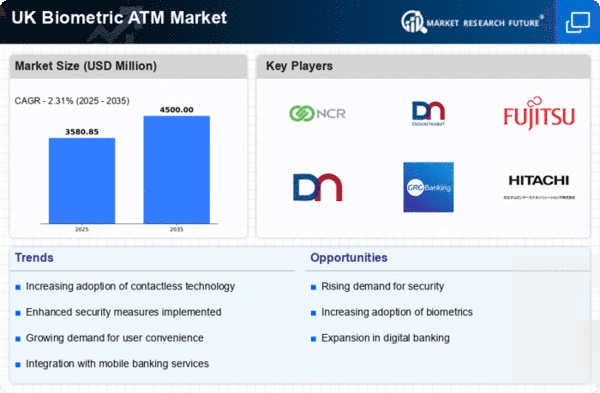Rising Security Concerns
The biometric atm market is experiencing growth driven by escalating security concerns among consumers and financial institutions. With the rise in identity theft and fraud, banks are increasingly adopting biometric solutions to enhance security measures. According to recent data, financial fraud in the UK has seen a notable increase, prompting institutions to seek advanced technologies. Biometric authentication methods, such as fingerprint and facial recognition, provide a robust solution to these challenges. The biometric atm market is thus positioned to benefit from this heightened focus on security, as institutions aim to protect customer data and reduce fraudulent activities. This trend is likely to continue, as consumers demand more secure banking options.
Technological Advancements
Technological advancements play a pivotal role in the growth of the biometric atm market. Innovations in biometric recognition technologies, such as improved algorithms and faster processing capabilities, are making these systems more efficient and user-friendly. The integration of artificial intelligence and machine learning into biometric systems enhances their accuracy and reliability. As a result, financial institutions are more inclined to invest in these technologies, leading to a projected growth rate of approximately 15% in the biometric atm market over the next five years. This trend indicates a shift towards more sophisticated banking solutions, as institutions strive to stay competitive in a rapidly evolving market.
Consumer Demand for Convenience
The biometric atm market is significantly influenced by consumer demand for convenience and seamless banking experiences. As customers increasingly seek quick and efficient transactions, biometric solutions offer a streamlined approach to accessing funds. The ability to withdraw cash or perform transactions without the need for cards or PINs appeals to a tech-savvy demographic. This shift in consumer behavior is prompting banks to adopt biometric systems, which are expected to account for a larger share of the market. The biometric atm market is thus likely to see a surge in adoption as institutions respond to these evolving consumer preferences, enhancing customer satisfaction and loyalty.
Regulatory Compliance and Standards
Regulatory compliance is a crucial driver for the biometric atm market, as financial institutions must adhere to stringent security standards. The UK government has implemented various regulations aimed at protecting consumer data and preventing fraud. These regulations encourage banks to adopt biometric technologies as a means of compliance. The biometric atm market is likely to benefit from this regulatory landscape, as institutions seek to align their operations with legal requirements. Furthermore, compliance with these standards can enhance a bank's reputation, attracting more customers who prioritize security in their banking choices.
Competitive Pressure Among Financial Institutions
The competitive landscape within the banking sector is a significant driver of the biometric atm market. As financial institutions strive to differentiate themselves, the adoption of biometric technologies becomes a strategic advantage. Banks that implement biometric systems can offer enhanced security and convenience, appealing to a broader customer base. This competitive pressure is likely to accelerate the growth of the biometric atm market, as institutions invest in innovative solutions to attract and retain customers. The ongoing race to provide superior banking experiences may lead to increased collaboration between technology providers and financial institutions, further propelling market expansion.

















